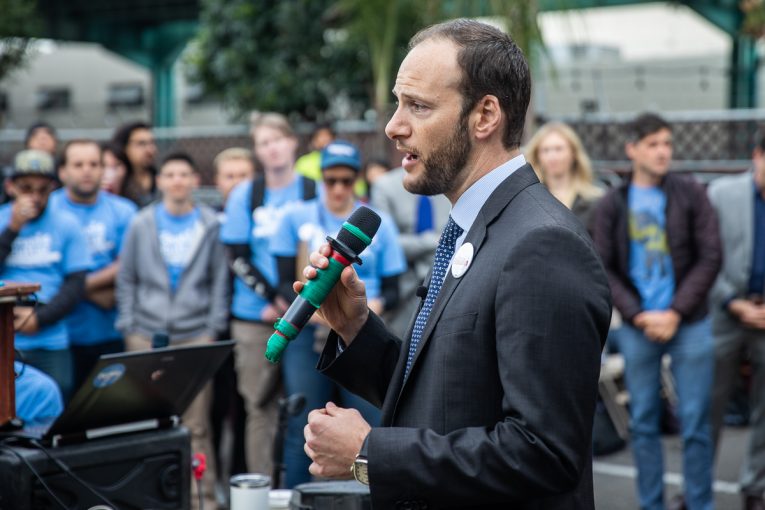

Throughout his campaign for San Francisco District Attorney, Chesa Boudin was open about the impact of being a young child of incarcerated parents and described what it was like on many occasions to visit his parents on a regular basis when they were behind bars.
It is fitting then that among his first initiatives will be a primary caregiver diversion program – the implementation of a new state law aimed at keeping children united with their parents and ending a generational cycle of incarceration.
Last year, Senator Nancy Skinner authored SB 394, which Governor Gavin Newsom signed into law in October.
The law creates a diversion program for primary caregiver parents of minor children.
Yesterday, Chesa Boudin announced that, effective immediately, prosecutors in the San Francisco DA’s office will provide this diversion program as an option for eligible individuals to avoid the devastating trauma and instability caused by parental incarceration, while also ensuring accountability and rehabilitation for the accused.
“SB 394 is a commonsense reform,” Senator Skinner said in a statement last October. “When incarceration separates a child from their parent, the outcomes for the child are rarely good. Kids often  end up in foster care, with the absence of strong family ties impacting children’s physical, emotional, and psychological health. SB 394 will improve kids’ lives.”
end up in foster care, with the absence of strong family ties impacting children’s physical, emotional, and psychological health. SB 394 will improve kids’ lives.”
“I grew up visiting my parents behind bars. I know the kind of trauma the sudden loss of a parent can have on a child and the kind of resources that are needed to make that child whole again,” said District Attorney Chesa Boudin. “This is about taking responsibility, protecting the sanctity of the family, and ensuring innocent children are not condemned to repeat the mistakes of their parents.”
Eligible defendants can earn a dismissal through a rigorous diversion program that includes parenting classes. Incentivizing parents to care for their dependent children helps break the cycle of incarceration and keeps our communities safer.
The effects of parental incarceration have also been disproportionately egregious to communities of color: 70 percent of children with incarcerated parents are black or brown, victimized both by their parents’ choices and society’s commitment to meting out the harshest possible punishments.
According to Senator Skinner’s office, the law recognizes “a child’s separation from a parent can inflict long-lasting negative impacts on parents. Parents separated from their children can suffer similar physical, emotional, and psychological problems and often have difficulty reestablishing the parental bond.”
“Pediatricians witness first-hand the trauma and harm to the health and well-being of children when they are separated from parents who are incarcerated. We are thrilled that Gov. Newsom, consistent with his priority of giving each California child the start in life that they deserve, has signed Sen. Skinner’s evidence-based and thoughtful measure to provide alternatives to prison for parents and caregivers that will keep families together and our communities safe,” said Kris Calvin, CEO, American Academy of Pediatrics, California.
The pretrial diversion program under the law is optional with all involved – judge, district attorney, and public defender needing to agree to establish it in the county.
A county’s diversion program might include rehabilitative offerings such as mental health, drug/alcohol treatment, anger management, vocational, educational, and job training services.
A person would only be eligible for diversion if they are the parent or legal guardian of a minor, live in the same household as the child, provide care or financial support, and can substantiate that their absence in the child’s life would be detrimental to the child. The court must also be satisfied that the parent/caregiver does not pose a threat to public safety.
Under SB 394, in each case, the diversion program would only be available to people charged with a misdemeanor or a nonserious, nonviolent felony. A judge must agree that the person is suitable for the program. In addition, a person would not be eligible if the alleged crime was committed against the custodial child.
According to the release from the San Francisco DA’s office, under state law, the following offenses will be eligible for primary caregiver diversion:
- All misdemeanors are eligible.
- All felonies are eligible except those described in Penal Code section 1192.7, 1192.8 or 667.5(c).
- The crime for which the person is seeking diversion must not have been committed against the person for whom the accused is the primary caregiver.
- The court must also be satisfied the accused does not pose an unreasonable risk of danger to public safety if allowed to remain in the community.
“SB 394 provides a constructive option to maintain the well-being of both parents and kids,” Senator Skinner added last October. “It also establishes a path for rehabilitation from a wrongdoing that minimizes the negative outcomes on families and children.”
—David M. Greenwald reporting

